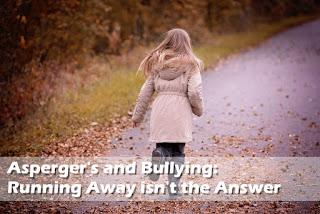
Like many bloggers I have a stash of topics that I keep for later because they're too raw, too "popular" or too difficult to think about at the time. I often look back at these to see if they gel with my experiences of the week. In this case, I looked back over an article about the bullying and savage attack of a boy with Asperger's Syndrome in Melbourne, Australia.
This struck a chord with me because this week, I responded to a post from a mother who was talking about moving to a different city because her son was being bullied.
I've talked about bullying quite a bit on this blog before but this time I want to talk about why running from the problem is counter-productive and go over some options for dealing with bullies in their own environment.
Why Running is Futile
Short term running is fine. If your life actually is in danger, or if you're about to be physically assaulted, then by all means, run away from that current situation.The best places to run to are crowded places with plenty of responsible adults around. Never run and hide in an isolated place.
While running away from an immediate problem is generally an appropriate reaction (unless you're running towards other dangers), it's never a good long term fix.
Metaphoric "running away" is worse. Changing schools or states does little to help the victims of bullying and does nothing to address the problems.
Bullying is Everywhere
Unfortunately despite all the best intentions in our society, bullying is a pervasive, insidious activity that is present nearly everywhere. No amount of running will ever put enough space between you and the nearest bully.Bullying occurs in schools, scout halls, sporting fields, places of worship, workplaces and even family gatherings. You'll always be faced with bullies and it's important to know how to recognize and protect yourself from them.
Running from one bullying situation to another is not going to teach you anything.

Bullying is Targeted
Bullies don't attack everyone. They may start out with some generalised bullying but what they're really looking for are potential targets. Once you become a bullies "target" they'll focus all of their attention on you.The easiest way to become a target is simply to be "different", particularly if you're "visually different". You might have different racial characteristics or a visible disability. You might have clothing or behavior that is required by your religion or you may have gender or sexual differences that come out your behavior or clothing.
People often say to the parents of kids with autism; "but your son/daughter doesn't look autistic". It's actually a bit of a sore point with people on the spectrum because we don't "look" any different from everybody.
To be fair however, when it comes to kids on the autism spectrum, the visible differences are usually quite obvious in clothing and behavior. These differences can include;
- Clothing supporting the special interests but which is out of step with the rest of the class (for example older kids wearing Spongebob T-Shirts).
- Frequent "Nerdish" or "Fanboy" behaviour, for example; doing "Yoda" voices in senior years.
- Sensory issues with texture, foods, noises, smells, lights
- Misinterpretations of social cues which are "amusing" to other students.
- A "nerdish" level of knowledge on a subject such as comic books.
- Socially awkward behavior around others and an inability to "fit in" to the normal groups.
- Meltdowns or Shutdowns, "Rage Fits" etc. in front of the class

Options for the Prevention of Bullying
There's a lot of discussion on bullying out there in the social world and it seems that everyone has an opinion or a childhood story. Many of these revolve around violent solutions, such as learning karate or attacking the bully in some way.Violent options might have worked in the past but they won't work in today's world. At best, you'll land yourself in disciplinary or legal trouble and at worst, you could suffer injuries or get yourself incarcerated. You'll have to try other methods.
Talk to People in Authority
Usually the first thing that you should do is go talk to someone in authority. The exceptions to this rule are;- When the person in authority has a strong relationship to the bully
- When your position is unsafe (for example, if your workplace is more likely to support the bully)
If either of these things are the case, then you can continue to fight but you need to realize that you have an unreasonably high chance of losing. In these situations, bureaucracy almost always wins out unless you have a strong group of supporters who can verify your experience.
If you can't find a strong group of supporters you my be better off cutting your losses and leaving because it means that you're really not in a safe environment.
If you do speak with someone in authority, remember that you have a lot of control over the situation. If you're not ready for a confrontation, you can ask that they do not confront the bully but instead;
- be more vigilant when you're required to interact with the bully.
- provide you with alternative interactions (ie: group work with different people).
- provide you with a safe space to retreat to if you feel threatened.

One of the most important things is to get bullying documented early because one of the main parts of the bullying definition is that the activity has to be sustained and repeated.
It will also help if you start keeping a diary of the dates, times and locations of behaviours that are affecting you -- but do not show the diary to the bully, don't mention the diary to them and don't make notes in the diary in front of them.
If you find yourself getting on well with the person in authority, you might want to take them on as your bullying counselor. Ask them for help and advice in resolving the situation.
Join or Form an Anti-Bullying Group
If you don't feel that your support person is providing adequate support, the alternatives are to either escalate the problem to someone who can or join a group of people in a similar situation.Forming or joining a group is usually the easiest option.
Pay special attention to the behavior of your bully(s). In order to form a group, you need to find others who are being bullied, ideally by the same bully but not necessarily. Make friends with these people but don't talk about bullying to start with. Find as many people in a similar situation to you as possible -- even if they're in different year groups. Try to spend lunch times with them.
When bullies turn up, be sure to support each other. If the bullies manage to catch any of you by yourselves, you need to report it as a group.
Once the bullies realize that they're dealing with a group instead of an individual, you'll find that their attacks drop off and they'll look for smaller, easier targets.
Escalate Problems to the Community
The autism community is a loyal one and we take bullying very seriously. If you're being bullied and you're unable to find a workable solution, then check online. Look for autism communities in your area who will lend support.Older members will often happily act as mentors and will guide you through traumatic events.
Younger members can provide "real-life" friendship and support. You probably won't find anyone to actually "fight off" the bullies but you will find people who are willing to intervene on your behalf, people who can advise you on what to do and qualified people who, if necessary will talk to those in authority.

The best places to start looking for help are autism groups on Facebook and forums such as WrongPlanet.net. Make sure that you join private or hidden groups rather than public ones as you need to know that your posts are not being shared on your home page.
Links to my other posts on bullying;
I hope this post has helped you to get a perspective on why running away isn't the answer and has provided you with some viable options. Here are some of my other posts on bullying;- Understanding Adult Bullying
- The Rise of Cyber Bullying
- Bullying in the Workplace
- Bullies and Bullying - An Introduction
- The Primary (elementary) School Bully
- The High School Bully
- Bullying outside of School
- Bullying: The Bullies Side of the Story
- Answers to Some Questions on Cyberbullying
- Autism and Aspergers and Surviving in the Workplace
- Making Yourself Less of a Target for Bullying

